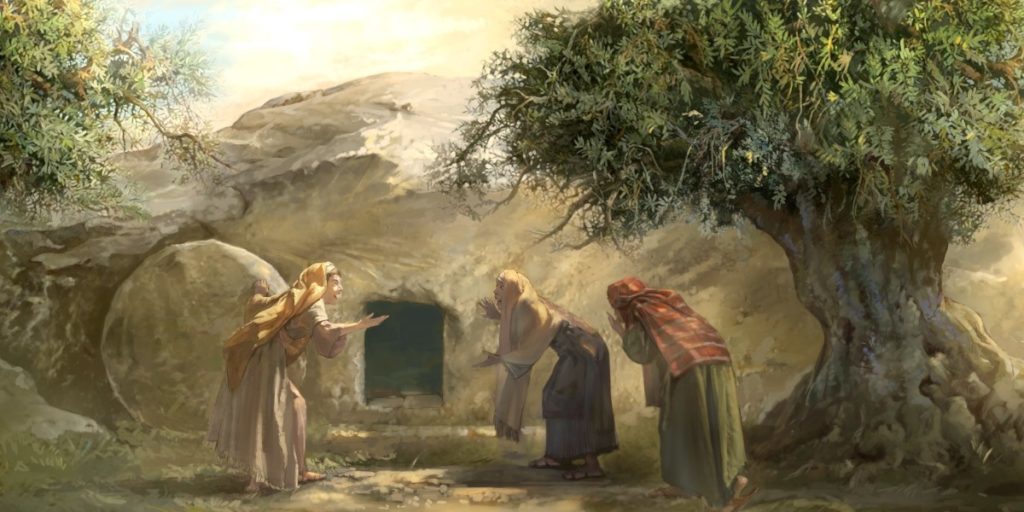
Resurrection Hope in a Season of Death
It’s April, and we are still under quarantine. The hospitalized can’t see loved ones, patient wards continue to expand, and more burial plots are dug. While most in the world ignore the cries of the nearly 125,000 babies who are aborted globally every day, very few on the planet can now ignore the reality of the 1,000,000+ who have died from COVID-19 in recent months. God is using a global pandemic to help all see that “all flesh is grass” that withers, but he would also have us recall that his word is like granite that remains unchanged (Isa. 40:6–8).
With the rise of every new day God reminds those with eyes to see that light is stronger than night. The bursting buds and bird songs ring out that spring overcomes winter and that resurrection hope is real. As Jesus encouraged, “I am the resurrection and the life. Whoever believes in me, though he die, yet shall he live” (John 11:25). With the rise of every new day God reminds those with eyes to see that light is stronger than night. Click To Tweet
Following the original creation of humanity, Jesus’s resurrection unto glory is the most decisive event in the history of mankind, for it brings the dawning of the new creation (2 Cor. 5:17) and validates that those in Christ are no longer imprisoned under sin, the payment for which is death (Rom. 6:23; 1 Cor. 15:17). The New Testament is clear that the Scriptures foresaw “that the Christ should suffer and on the third day rise from the dead” (Luke 24:46; cf. 24:7; John 20:9; Acts 17:2–3; 1 Cor. 15:4) and that, “by being the first to rise from the dead, he would proclaim light” both to the Jews and the Gentiles (Acts 26:22–23).
Resurrection in the New Testament
Jesus’s resurrection creates for all in him a living hope for “an inheritance that is imperishable, undefiled, and unfading” (1 Pet. 1:3–5), and it provides hope for the entire created order that it will be renewed (Rom. 8:18–25; cf. Col. 1:20)—“Christ the firstfruits, then at his coming those who belong to Christ” (1 Cor. 15:23).
Jesus compared God’s power to raise the dead (e.g., Deut. 32:39; 1 Sam. 2:6; 2 Kgs. 5:7) with his power to overcome spiritual death by presently giving people eternal life (John 3:16; 5:21, 24–26). Such initial “resurrection” gives certainty of consummate resurrection following physical death, first spiritually and then bodily (5:28–29; 11:25–26; 14:2–3). Paul, too, notes that, although “we were dead in our trespasses,” God has already “made us alive together with Christ … and raised us up with him and seated us with him in the heavenly places in Christ Jesus, so that in the coming ages he might show the immeasurable riches of his grace in kindness toward us in Christ Jesus” (Eph. 2:4–7).
Believers are, thus, already experiencing a spiritual resurrection, and Christians who die before Christ’s second appearing enter into a state of conscious rest in the presence of Jesus (Luke 23:43; John 14:2–3; 2 Cor. 4:14; Phil. 1:23). But when Christ does return, those who already experienced initial spiritual resurrection will then be given new supernatural bodies that will never wear out (Rom. 8:11; Phil. 3:20–21). “The Lord himself will descend from heaven with a cry of command, with the voice of an archangel, and with the sound of the trumpet of God. And the dead in Christ will rise first. Then we who are alive, who are left, will be caught up together with them in the clouds to meet the Lord in the air, and so we will always be with the Lord” (1 Thess. 4:16–17).
The Nature of Resurrection Hope
What is resurrection hope? It is not only resurrection itself but also what follows resurrection—namely, joy in the presence of our Savior. Let us consider Isaiah 53:10–11, which parallels human and divine perspectives on Christ’s death and resurrection.
It was the will of the Lord to crush him; he has put him to grief; when his soul makes an offering for guilt, he shall see his offspring; he shall prolong his days; the will of the Lord shall prosper in his hand. Out of the anguish of his soul he shall see and be satisfied; by his knowledge shall the righteous one, my servant, make many to be accounted righteous, and he shall bear their iniquities. What is resurrection hope? It is not only resurrection itself but also what follows resurrection—namely, joy in the presence of our Savior. Click To Tweet
Through direct prophecy, both verses begin by detailing Christ’s brutal suffering unto death, and then they highlight his resurrection unto joy. First, God’s delight was to “crush” his servant-person, to “put him to grief,” the manner of which would be a penal substitutionary death as “an offering for guilt” that would include the deepest “anguish.” In this one act, God’s righteous servant would “bear [the people’s] iniquities.”
But there is more. Three specific, all-motivating elements would rise on the other side of this atoning sacrifice—“he shall see his offspring; he shall prolong his days; the will of the Lord shall prosper in his hand.” Seeing, prolonging, prospering! Over seven hundred years before Jesus’s appearing, Isaiah implies the reality of resurrection because he foresaw that the wrath-bearer, whom God identifies as “the righteous one,” would continue to carry out God’s will by lastingly saving “many” blood-bought “offspring” from the peoples of the world (cf. 54:3). His atoning work would “sprinkle many nations” (52:15) and “make many to be accounted righteous” (53:11). Yahweh’s words identify what this reality would bring to the servant: “Out of the anguish of his soul he shall see and be satisfied” (53:11). The Hebrew here actually suggests the satisfaction was the seeing of the many offspring who would be accounted righteous—a people for God ransomed “from every tribe and language and people and nation” (Rev. 5:9).
It seems likely, therefore, that the nature or content of “the joy that was set before [Jesus],” by which he “endured the cross,” was none other than the community of saints that would be birthed from his resurrection event (Heb. 12:2). And our hope of resurrection now includes our participating with the many in Christ. Such compelling joy motivated Christ to carry his cross, and it should motivate us as we carry ours through this season of death (Mark 8:34; Heb. 12:2–3). And having already been united with Christ and raised with him in an inaugurated way, we are already tasting the joys of Christian community with every new soul that is saved.
All Will Meet Him
The Old Testament anticipates the resurrection of God’s people following an exilic death (e.g., Deut. 32:39; Hos. 6:2; Dan. 12:2), and it clarifies that the new life of the community will be multiethnic in nature and will result from the representative suffering servant’s own triumph over death (Isa. 53:10–11; Ps. 16:10). Jesus Christ’s resurrection on the third day fulfills Old Testament predictions (Luke 24:46–47; 1 Cor. 15:4), establishes him as the reigning King (Rom. 1:4; Matt. 28:18), inaugurates the new creation (1 Cor. 15:20, 23; 2 Cor. 5:17), justifies the many (Rom. 4:25), calls believers to walk in newness of life (Rom. 6:4; Col. 3:1), births a global mission (Matt. 28:19–20; John 20:19–22; Acts 1:8; Rom. 1:16–17; Gal. 1:11–12), and supplies hope to all believers of their own resurrection (Rom. 8:11; 1 Cor. 15:43–44, 49; Phil. 3:20–21; Heb. 9:27–28). It also warns non-believers that they will indeed meet the heavenly Judge face-to-face (Dan. 12:2; Matt. 25:46; John 5:28–29).
In this season of death, the resurrected King proclaims, “I am the resurrection and the life. Whoever believes in me, though he die, yet shall he live, and everyone who lives and believes in me shall never die. Do you believe this?” (John 11:25–26).
****
Editor’s Note: Dr. DeRouchie drew the body of this article from his longer work titled, “Why the Third Day? The Promise of Resurrection in All of Scripture.” You can find it at https://www.desiringgod.org/articles/why-the-third-day or download it here: http://jasonderouchie.com/wp-content/uploads/2019/07/2019-Why-the-Third-Day-Resurrection-DeRouchie.pdf. You can find more resources from Dr. DeRouchie at jasonderouchie.com.

